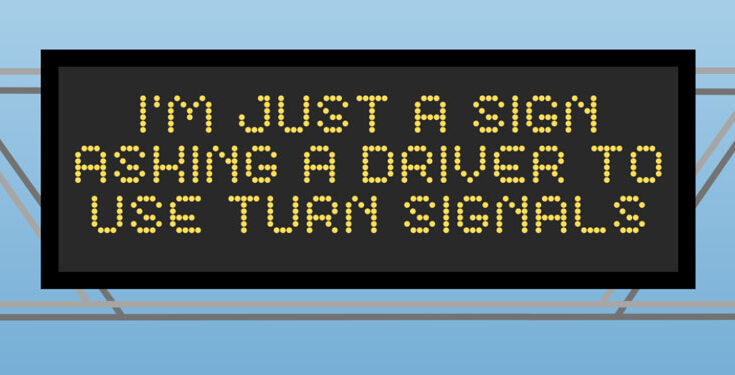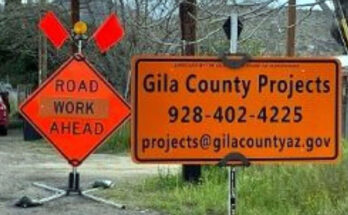Contributed Photo/Courtesy ADOT: One of the safety contest winning signs advises of the use of turn signals.
Traffic safety messages focus on buckling up, using turn signals
Contributed Article/Courtesy ADOT
PHOENIX – The votes are in and the winners of the Arizona Department of Transportation’s Safety Message Contest have been selected!
Thousands of votes were cast by the public last month for 10 message finalists. The two winning traffic safety messages are: “SEATBELTS ALWAYS PASS THE VIBE CHECK” and “I’M JUST A SIGN ASKING A DRIVER TO USE TURN SIGNALS”.
“Seeing thousands of Arizonans participate in our Safety Message Contest, from creating their own messages to voting for other safety messages, is exciting and a positive for all of us,” ADOT Director Jennifer Toth said. “The purpose of the contest is to kick-start conversations about making better decisions behind the wheel, so everyone can reach their destination safely.”
During the first phase of the contest, 3,700 entries were submitted. Those entries were whittled down to 10 finalists, and a public vote last month determined the winners. Today, authors of the two winning messages were invited to ADOT’s Traffic Operations Center in Phoenix to type their traffic safety message into the Dynamic Message Sign system and see them go live via highway cameras. Both winning messages will appear on overhead message boards statewide through the weekend.
Elise Riker, a Chandler resident, is a business professor at Arizona State University and submitted one of the winning traffic safety messages.
“I hope the message makes people chuckle and happy that they are wearing a seatbelt: you pass the vibe check,” she said.

Gina Finkelstein, a software support engineer from Mesa, was inspired by the 1999 film, “Notting Hill” when she created her winning traffic safety message.
“Using turn signals before you turn makes you a total star,” she said, “just like Julia Roberts in ‘Notting Hill,’ only bigger and better!”
ADOT displays unconventional safety messages on overhead signs as part of an effort to change driver behavior and encourage motorists to make better decisions while driving. According to national statistics, driver behavior, like choosing to speed, driving distracted, impaired, or reckless, plays a role in more than 90% of vehicle crashes.







